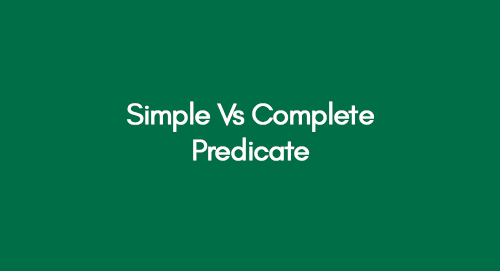
LLM Dissertation Examples
May 17, 2023
A Comprehensive Guide to Crafting an Effective Literature Review Template
May 19, 2023Have you ever wondered how sentences are formed to read and sound interesting?
Creating perfect sentences is an art that only a few people get through.
But did you know that the history of sentence formation dates back to the early 18th century?
In ancient Greece, philosophers like Plato and Aristotle spent years trying to find the perfect sentence structure. This heavily included laying the foundation for modern grammar and syntax, choosing the right vocab, and other duties.
Review Our Quality Dissertation Examples
Get 3+ Free Dissertation Topics within 24 Hours
To conclude, the philosophers introduced two types of sentences: simple predicates and complete predicates. Let's explore their origins and differences.
These include verbs, such as "run," "jump," or "sing," that represent either an action or a conversation.
Most of the time, using simple predicates brings energy and excitement to our conversations.
On the other hand, complete predicates are like the supporting cast, adding extra details and sparking life to a sentence.
They have the main verb and words that tell us more about the action, such as adverbs or objects. Our sentences become vibrant and lively with complete predicates!
With that said, let's look at what simple and complete predicates mean.
Get 3+ Free Custom Topics within 24 hours;
Understanding Simple Predicates: A Closer Look at Definitions and Examples
The fundamental step to learning simple predicates is by understanding the grammar itself.
Think of it as the main verb of a sentence that shows what the subject is doing or how they are.
What makes a simple predicate different from a complete predicate is its focus solely on the verb without any extra words or details.
Examples of Simple Predicates
To help you understand simple predicates better, given below are a few simple predicate examples that showcase the main verb or verb phrase in a variety of sentences:
- The audience applauded after the performance. (Simple Predicate= "applauded")
- Emily has been practising her piano skills diligently. (Simple predicate= ''has been practising")
- The birds will migrate to warmer regions during winter. (Simple Predicate= "will migrate")
In every instance, the simple Predicate is the verb or verb phrase that conveys the action carried out by the subject. The right positioning of the Predicate makes it better to understand the crux of the sentence.
Complete Predicate: Definition and Examples
Complete predicate is another critical component that shapes our understanding of sentence construction. Not only it encompasses the main verb or verb phrase but also all the words that provide additional information about the verb, such as direct objects, indirect objects, and adverbs. In some cases, it offers a more comprehensive description of the subject's action or state of being.
Dissertation Topic and Outline Examples
Engaging Examples of Complete Predicates
To help you get the idea, let's dive into some interesting complete predicate examples.
- The artist painted a beautiful landscape for the art exhibition. (Complete Predicate: "painted a beautiful landscape")
- The students have been studying diligently for their exams. (Complete Predicate: "have been studying diligently for their exams")
- The family will travel to the beach for a much-needed vacation. (Complete Predicate: "will travel to the beach for a much-needed vacation")
In these examples, the complete predicate includes the verb or verb phrase and any additional words to understand the sentence better.
Differentiating Simple Predicate and Complete Predicate
While most people think of simple & complete predicates as the same thing, they are two different terms.
Scope of Information Conveyed
A simple predicate provides the basic action or state of being, while a complete predicate expands upon this by incorporating additional details to understand the sentence better.
Inclusion of Modifiers and Complements
While a simple predicate is a verb phrase, a complete predicate includes modifiers (such as adverbs) and complements (such as direct or indirect objects). This is often done to describe or complete the action or state of being.
Here's a quick example of both in the same sentence :
- John runs.
- Simple Predicate: runs
- Complete Predicate: (none)
- John runs every morning in the park.
- Simple Predicate: runs
- Complete Predicate: runs every morning in the park
The simple Predicate here is "runs" in the first example since it solely expresses the action. However, the second example shows how the complete predicate includes additional information, including "every morning in the park,"
Identifying the Complete Predicate of a Sentence
Now comes the interesting part of the blog section: understanding the differences between simple and complete predicates.
Below is a quick breakdown of identifying a complete Predicate.
- Locate the Verb: Identify the sentence's main verb or verb phrase. This will be the core element of the complete Predicate.
- Analyse Verb Phrases and Additional Elements: Look for modifiers, complements, or other words directly related to the verb. These elements contribute to the complete Predicate.
Let's understand the process with this example:
Example #1: "The students enthusiastically presented their science projects to the class."
- Locate the Verb: The main verb in this sentence is "presented."
- Analyse Verb Phrases and Additional Elements: This case has no verb phrases. However, "enthusiastically" is an adverb modifying the verb "presented." Additionally, the term "their science projects to the class" functions as a direct object complementing the verb "presented."
Therefore, the complete Predicate of the sentence is "enthusiastically presented their science projects to the class."
The Benefits of Hiring a Professional Assignment Writing Service
Impact and Significance of Simple and Complete Predicates
Like grammar, simple and complete predicates are equally important for constructing clear and meaningful sentences.
Below are some more reasons to use these types of predicates
Influence on Sentence Meaning and Structure
Simple and complete predicates shape the meaning and structure of a sentence. This may include or exclude modifiers, complements, and other elements that can alter the intended message.
Conveying Specific Actions and Descriptions
Complete predicates provide a more detailed account of actions or states of being. With the help of modifiers and complements, one can paint a clearer picture and add depth to our descriptions.
Effective Communication and Writing
A solid grasp of simple and complete predicates enhances our communication ability. Understanding how to construct sentences with appropriate predicates can help convey ideas better.
Conclusion
In a nutshell, both simple and complete predicates play distinct roles in structuring a structure. While a simple predicate focuses on the core verb or verb phrase, a complete predicate expands upon this by incorporating modifiers and complements. Recognizing the difference between the two is essential to conduct meaningful sentences.
So, the next time you're constructing a sentence, pay attention to the verb and consider whether it forms a simple predicate or a complete predicate.
Get an Immediate Response
Discuss your custom requirements with our writers
Free Online Plagiarism Checker For Students
We will email you the report within 24 hours.
Upload your file for free plagiarism
























